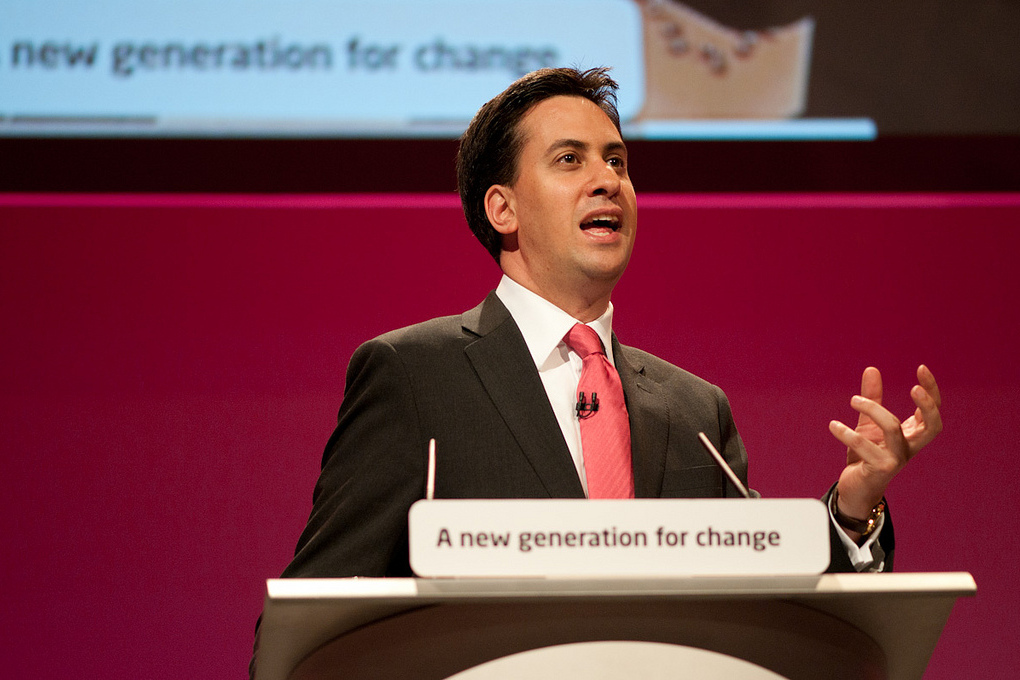White heat of technology? More like lukewarm
What would a speech on technology made by a Labour leader sound like today?


Next week will see the 50th anniversary of one of the most famous speeches from a political conference. It must be said that the competition isn’t very high: Nye Bevan’s “naked” speech and Margaret Thatcher’s “the lady’s not for turning” are probably the only other contenders for the most celebrated speech accolade, but Harold Wilson’s “white heat of technology” address to the Scarborough conference still has resonance today.
As Labour meets for its annual conference in Brighton, it’s time to revisit Wilson’s speech and ask what would be in a speech if Ed Miliband would pick up the theme today.
For a start, he wouldn’t start talking about harnessing science to socialism or socialism to science: it’s almost unbelievable that a political leader of such recent vintage could speak like that - I’d hazard a guess that “socialism” will be mentioned less often than the word “market”. Nor will he talk about the Post Office being in public ownership. There’ll be no talk about the Soviet Union, nor will there be any talk about insufficient university places for all our scientists and engineers.
So, what would he talk about? He’d certainly mention the rate of change: Wilson’s speech pointed out that they were living through a period of unprecedented technological upheaval. But the pace was like being stuck in treacle compared to the rate now. Wilson’s speech pre-dated the formulation of Moore’s Law so we didn’t really have any notion just how fast the world was about to change. He was talking about a period when computers had shrunk from the size of large room to the size of a mid-sized one.
Sadly, he’d still mention the shortage of scientists and engineers. We’re not training enough people in this area and they’re not in positions of power. The number of scientists in the cabinet? A big fat zero. How about the number of scientists in the shadow cabinet? An equally fat zero.
In CP Snow’s celebrated essay on Two Cultures, he decried the gap between arts and sciences – but there’s an even bigger gap between politics and science. Mrs Thatcher remains the only well-known UK boffin to have shimmied up the greasy pole. There’s arguably an even bigger gap between technologists and science: former telecoms engineer Chi Onwurah sits in the shadow cabinet but she’s a lone figure. The minister for universities and science was policy researcher while his shadow minister for science and technology is a lawyer – not a ringing endorsement for technical training.
Then there’s the issue of high-tech firms. There are plenty of brains in this country, plenty of technologists with bright ideas and entrepreneurial drive – the trouble is that so many of them have to get funding outside the UK. Miliband should ask himself why that is and seek to offer ideas to make them stay. He started to make noises about rewarding companies prepared for long-term investment, and for closer links with finance and business; perhaps he should flesh out some detail.
Sign up today and you will receive a free copy of our Future Focus 2025 report - the leading guidance on AI, cybersecurity and other IT challenges as per 700+ senior executives
Maybe he’d turn his attention to government – having a few digs at the fiasco of Iain Duncan Smith’s universal credit scheme. He’d probably talking grandly about harnessing IT to the general good, forgetting the gold-plated, copper-bottom cock-up that was Labour’s NHS IT reorganisation. What he should talk about is the importance of open source software and a move away from the dominance of US software providers but there wouldn’t be a tweet about it.
It would be good if Miliband could then turn his attention to schools. Decrying the failure of schools to turn out potential programmers and software engineers, it would be nice to think that he would announce more measures to improve the technical skills of a new generation: replacing Latin with Python would earn him heartfelt gratitude from cohorts of schoolchildren.
For older students, there’s the power of the Internet. Wilson used the “white heat” speech to float the idea of an Open University. That’s old hat now but he could offer more support for MOOCS and the way that learning can continue beyond the four walls of a college; maybe a formal system of accreditation. One thing that he certainly should address is the gap between the number of skilled professionals required and the number being produced – an issue that neither politicians nor industry has any idea how to solve.
As far as Cloud Pro is concerned, we would want to see more emphasis on the cloud: a more rigid adherence to the Cloud-First policy, wider use of the Cloud Store, making it an easier option for local governments. Cloud computing provides a massive opportunity for improvements in education, flexibility in business and cost savings in government
It would be great also to hear of a greater push to openness within the government, with greater transparency in its dealings with the British public and the level of information it publishes. It would be great to have a commitment towards a smarter use of data throughout the government – targeting cash and resources where there are most needed.
I don’t think we’ll hear any more of the phrase “white heat” of technology: it was always a slightly derisory phrase – and one quickly lampooned - but Miliband should be emphasising the importance of science and technology as a means of kick-starting the economy.
It’s all a pipedream, both Labour and Conservatives will talk vaguely of the importance of technology to the country’s future but will do damn all to ensure that the skills shortages are addressed; that scientists and technologists are rewarded adequately; that UK companies can be funded and developed in the UK and a new generation of engineers are ready to take their place in this technological world.
What we’ll get is platitude and cliché by the bucket load; none of which will have half the impact of Wilson’s speech – disappointing as it turned out to be.
Max Cooter is a freelance journalist who has been writing about the tech sector for almost forty years.
At ITPro, Max’s work has primarily focused on cloud computing, storage, and migration. He has also contributed software reviews and interviews with CIOs from a range of companies.
He edited IDG’s Techworld for several years and was the founder-editor of CloudPro, which launched in 2011 to become the UK’s leading publication focused entirely on cloud computing news.
Max attained a BA in philosophy and mathematics at the University of Bradford, combining humanities with a firm understanding of the STEM world in a manner that has served him well throughout his career.
-
 Trump's AI executive order could leave US in a 'regulatory vacuum'
Trump's AI executive order could leave US in a 'regulatory vacuum'News Citing a "patchwork of 50 different regulatory regimes" and "ideological bias", President Trump wants rules to be set at a federal level
-
 TPUs: Google's home advantage
TPUs: Google's home advantageITPro Podcast How does TPU v7 stack up against Nvidia's latest chips – and can Google scale AI using only its own supply?
-
 ‘A major step forward’: Keir Starmer’s £187 million tech skills drive welcomed by UK industry
‘A major step forward’: Keir Starmer’s £187 million tech skills drive welcomed by UK industryNews The ‘TechFirst’ program aims to shore up the UK’s digital skills to meet future AI needs
-
 Government’s ‘Humphrey’ AI tool helps local authorities cut costs
Government’s ‘Humphrey’ AI tool helps local authorities cut costsNews The Minute tool, part of the Humphrey AI assistant, is being trialled at 25 councils
-
 Starmer bets big on AI to unlock public sector savings
Starmer bets big on AI to unlock public sector savingsNews AI adoption could be a major boon for the UK and save taxpayers billions, according to prime minister Keir Starmer.
-
 UK government targets ‘startup’ mindset in AI funding overhaul
UK government targets ‘startup’ mindset in AI funding overhaulNews Public sector AI funding will be overhauled in the UK in a bid to simplify processes and push more projects into development.
-
 UK government signs up Anthropic to improve public services
UK government signs up Anthropic to improve public servicesNews The UK government has signed a memorandum of understanding with Anthropic to explore how the company's Claude AI assistant could be used to improve access to public services.
-
 The UK’s AI ambitions face one major hurdle – finding enough home-grown talent
The UK’s AI ambitions face one major hurdle – finding enough home-grown talentNews Research shows UK enterprises are struggling to fill AI roles, raising concerns over the country's ability to meet expectations in the global AI race.
-
 US government urged to overhaul outdated technology
US government urged to overhaul outdated technologyNews A review from the US Government Accountability Office (GAO) has found legacy technology and outdated IT systems are negatively impacting efficiency.
-
 Government urged to improve tech procurement practices
Government urged to improve tech procurement practicesNews The National Audit Office highlighted wasted money and a lack of progress on major digital transformation programmes
